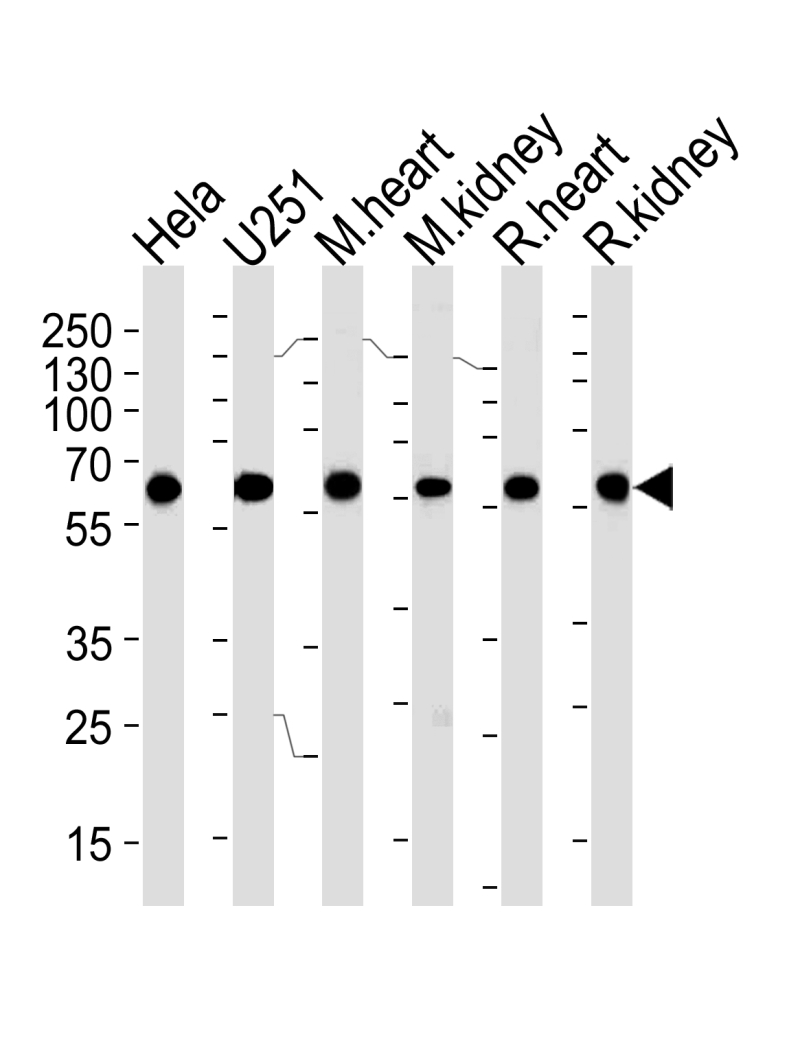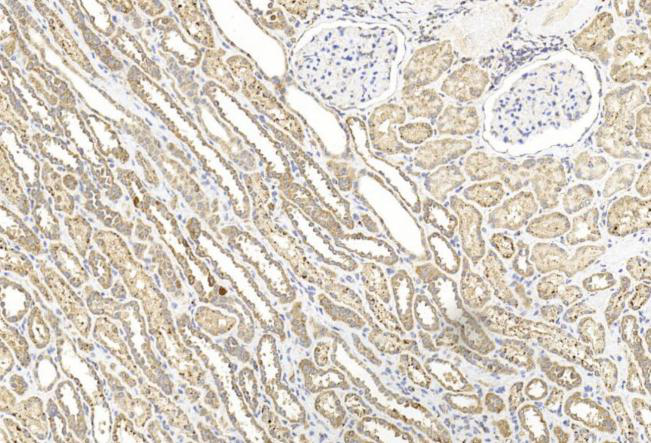

| WB | 1/1000 | Human,Mouse,Rat |
| IF | 咨询技术 | Human,Mouse,Rat |
| IHC | 1/250 | Human,Mouse,Rat |
| ICC | 技术咨询 | Human,Mouse,Rat |
| FCM | 咨询技术 | Human,Mouse,Rat |
| Elisa | 咨询技术 | Human,Mouse,Rat |
| Aliases | Bardet-Biedl syndrome 4 protein, BBS4 |
| Entrez GeneID | 585 |
| WB Predicted band size | 58.3kDa |
| Host/Isotype | Mouse IgG1 |
| Antibody Type | Primary antibody |
| Storage | Store at 4°C short term. Aliquot and store at -20°C long term. Avoid freeze/thaw cycles. |
| Species Reactivity | Human, Mouse, Rat |
| Immunogen | This BBS4 antibody is generated from a mice immunized with a recombinant protein between 1-240 amino acids from human BBS4. |
| Formulation | Purified antibody in TBS with 0.05% sodium azide. |
+ +
以下是关于BBS4抗体的3篇参考文献示例(注:内容基于公开研究背景概括,建议通过PubMed或Google Scholar核实具体信息):
---
1. **标题**: *BBS4 encodes a vertebrate-specific chaperonin-like protein and is a major locus for Bardet-Biedl syndrome*
**作者**: Mykytyn K, et al. (2004)
**摘要**: 本研究首次克隆了人类BBS4基因,并发现其编码的蛋白与分子伴侣蛋白结构相似。通过免疫印迹和免疫荧光实验(使用BBS4特异性抗体),证实BBS4在纤毛基部的定位,并发现其突变导致纤毛功能异常,与Bardet-Biedl综合征的发病相关。
---
2. **标题**: *A core complex of BBS proteins cooperates with the GTPase Rab8 to promote ciliary membrane biogenesis*
**作者**: Nachury MV, et al. (2007)
**摘要**: 研究揭示了BBSome复合体(含BBS4)在纤毛膜形成中的作用。通过BBS4抗体进行免疫共沉淀实验,证明BBS4与其他BBS蛋白相互作用,并调控Rab8 GTPase介导的囊泡运输,从而影响纤毛发生和信号传导。
---
3. **标题**: *BBS4 interacts with dynactin complex and regulates retrograde microtubule motor activity*
**作者**: Kim JC, et al. (2012)
**摘要**: 利用BBS4抗体进行免疫细胞化学和蛋白质互作分析,发现BBS4通过与动力蛋白激活复合体(dynactin)结合,调控逆向微管运输功能。研究提示BBS4缺失可能导致细胞内运输缺陷,进而引发Bardet-Biedl综合征的多器官表型。
---
**提示**:如需具体文献,建议检索关键词“BBS4 antibody” + “localization/function/Bardet-Biedl syndrome”,并优先选择近5年高被引研究以获取最新进展。
The BBS4 antibody is a crucial tool for studying Bardet-Biedl syndrome (BBS), a rare genetic disorder characterized by retinal degeneration, obesity, renal abnormalities, and polydactyly. BBS4 is one of over 25 known BBS-associated proteins encoded by genes linked to this ciliopathy. It plays a vital role in the formation and function of primary cilia, sensory organelles critical for cellular signaling and development. As a component of the BBSome complex, BBS4 facilitates cargo trafficking to ciliary membranes and regulates ciliary protein homeostasis.
Researchers use BBS4 antibodies primarily to detect and localize the BBS4 protein in tissues, cell lines, or model organisms (e.g., mice, zebrafish). These antibodies are validated for techniques like Western blotting, immunofluorescence, and immunohistochemistry, aiding investigations into ciliary dysfunction mechanisms. Studies often employ BBS4 knockout models to confirm antibody specificity, ensuring accurate detection of protein expression changes.
Commercial BBS4 antibodies are typically raised in rabbits or mice against specific epitopes, with validation data including molecular weight confirmation (~50 kDa) and loss of signal in BBS4-deficient samples. Their applications extend to exploring BBS4's interactions with other BBSome components (e.g., BBS1. BBS2) and its role in intraflagellar transport. Such research advances understanding of ciliopathies and potential therapeutic targets for BBS-related pathologies.
×